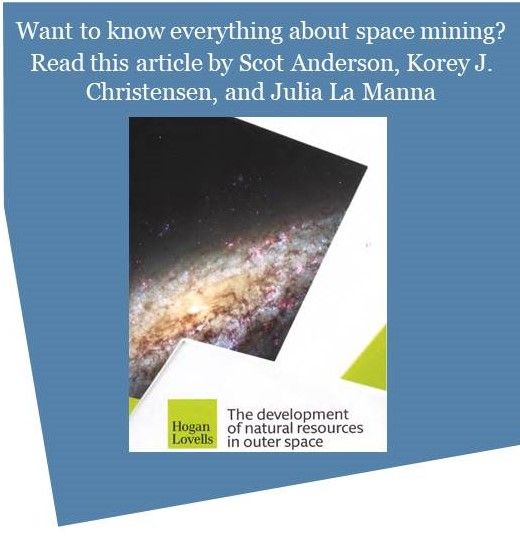Pierre Reuter, office managing partner of Hogan Lovells Luxembourg, interviews Scot Anderson about the recent business and legal cooperation between the USA and Luxembourg regarding space activities.
Pierre Reuter: Scot, you are the global head of energy and natural resources of Hogan Lovells located in Denver and you have a focus on space mining. Can you tell Delano's readers about the US-Luxembourg cooperation on space activities?
Scot Anderson: On 10 May 2019, the United States and Luxembourg signed a Memorandum of Understanding (MOU) relating to cooperation on space-related activities and issues. The MOU is potentially quite significant for businesses, research institutions, and policymakers interested in space activities, and particularly, in the utilization of space resources.
The joint press release announcing the MOU notes that the MOU will "serve as a vehicle to establish a more formal dialogue, sharing of expertise and exchange of information." It will promote the growth of the space industries in both nations "through new commercial and investment opportunities," and will allow the nations to coordinate on policy issues. The MOU also seeks to strengthen collaboration between the nations through joint projects, and facilitates the involvement of research entities and the private sector.
Pierre Reuter: This MOU is not surprising regarding both countries' commitment to develop this sector, is it?
Scot Anderson: In a statement about the MOU, Luxembourg's Deputy Prime Minister and Minister of Economy, Étienne Schneider, recognized that the U.S. and Luxembourg lead the international community in having been the first nations to create legal frameworks which recognize the use of space resources. He heralded the MOU as further progress towards "enhancing international cooperation" through Luxembourg's space resources initiative.
When working on a mining project, a mining company wants "security of tenure." In other words, the mining company wants to know that it has the legal right to extract the mineral, and that it will be able to possess and sell the minerals once they are extracted.
In outer space, there is no controlling governmental agency to grant a mining concession. The 1967 Outer Space Treaty is the foundational text of international space law, but it does not include provisions directly addressing resource development in outer space or on the Moon. Both the United States and Luxembourg have enacted laws design to address this open issue, and provide security of tenure to miners operating on celestial bodies. Given this common interest in promoting resource development in outer space, it is natural that the U.S. and Luxembourg would cooperate on space resource utilization and other space-related activities
Pierre Reuter: It is definitively a common opportunity to take advantage of. Here in Luxembourg we see concretely the results as time goes by. Do you see any relating trend in the USA?
Scot Anderson: Some of the companies that were among the first to focus on development of resources in space have turned their attention to other projects. There remains, however, considerable interest in resource development in space among US companies. There is also working being done by scientists and engineers to advance the required technology. For example, last year the Colorado School of Mines launched the world's first Space Resources Program which combines science, engineering, economics, entrepreneurship, and policy making.
Originally published by Delano
The content of this article is intended to provide a general guide to the subject matter. Specialist advice should be sought about your specific circumstances.


